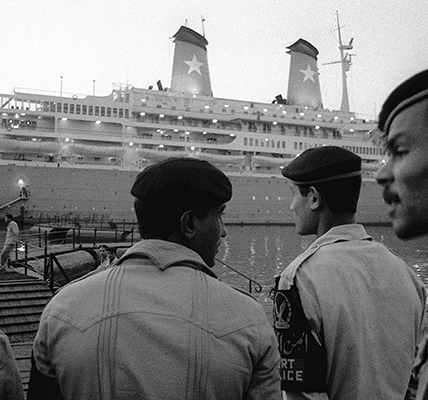Post-Fascism and Neo-Fascist in Italy: Legal Violations, Political Complicity, and the Erosion of Democratic Guarantees
More than eight decades after the fall of the Fascist Dictator Mussolini, Italy continues to grapple with the spectre of fascism. While the regime that once aligned itself with Hitler’s Germany was militarily defeated and legally dissolved, the ideology behind it never fully disappeared. Instead, it morphed, rebranded, and periodically re-emerged—particularly during moments of political instability and social anxiety. The existence of neo-fascism in Italy, the episodes of political violence and terrorism linked to it, and the gradual mainstreaming of authoritarian, illiberal movements also challenge the conventional notion that European institutions like the EU and NATO are sufficient safeguards of democratic values.
After the defeat of the Axis powers in World War II, the Italian Constitution of 1948, through its XII Transitory and Final Provision, banned the reorganisation of the fascist party under any form. Despite this, former fascist leaders and sympathisers regrouped under new banners. In 1946, the Movimento Sociale Italiano (MSI) was founded by Giorgio Almirante, a former official of the fascist regime. The MSI openly identified with the legacy of Mussolini and opposed the foundational principles of the new republican democracy. While it remained on the political fringes for decades, its very existence revealed the incomplete de-fascistization of Italian society and state institutions.
Neo-Fascist Terrorism: The “Years of Lead”
The most violent expressions of neo-fascism occurred during the so-called “Anni di Piombo” (“Years of Lead”), a period of intense political violence from the late 1960s to the early 1980s. While left-wing groups such as the Red Brigades captured much of the public’s attention, right-wing neo-fascist terrorism was equally, if not more, deadly, often targeting civilians to provoke a climate of fear and push for authoritarian solutions.
Heinous Neo-Fascist Terror Actions in History:
Piazza Fontana Bombing (1969): A bomb exploded in a Milan bank, killing 17 and wounding 88. Initially blamed on anarchists, evidence later pointed to the neo-fascist group Ordine Nuovo, with suspected connections to intelligence services. Italicus Express Bombing (1974): 12 were killed on a Rome-Munich train. Neo-fascist militants claimed responsibility. Bologna Massacre (1980): One of the deadliest attacks in Italian history, 85 people were killed in a railway station bombing. Neo-fascist group Nuclei Armati Rivoluzionari (NAR) was implicated. Investigations uncovered disturbing links between terrorists and elements within the state’s security apparatus. This “strategy of tension”, allegedly supported or tolerated by parts of the NATO-aligned Italian intelligence services, aimed to blame the violence on left-wing forces and justify repressive anti-communist measures. It demonstrated that fascist ideology never truly died, and could be instrumentalised in Cold War politics, even within the democratic West.
From Terrorism to Parliament: The Rise of “Post-Fascist” Parties
From Bombs to Ballots: The Mainstreaming of Post-Fascist Politics and Neo-Fascist Militants, by the 1990s, began adopting more palatable forms. In 1995, the MSI dissolved and rebranded itself as Alleanza Nazionale (AN) under Gianfranco Fini, who sought to distance the party from overt fascism while retaining much of its authoritarian ethos. AN eventually merged into Silvio Berlusconi’s coalition, playing a central role in multiple right-wing governments. In recent years, the Fratelli d’Italia (Brothers of Italy)—founded in 2012 by former MSI and AN members—rose to national power, while its members have notoriously refused to repudiate the fascist legacy, merely stating that the Italian Right has “handed fascism over to history.” Symbols and language from fascist ideology are embedded in the party’s aesthetics and messaging. These parties exploit nationalism, anti-immigrant sentiment, and economic anxiety to promote illiberal governance, often undermining the judiciary, the press, and civil rights—hallmarks of authoritarian governance within a democratic shell.
State Complicity and the Willful Failure to Enforce Anti-Fascist Laws
A core reason for the enduring presence of neo-fascist organisations in Italy lies in the systematic failure of the state to enforce its own laws. The Legge Scelba (1952) and Legge Mancino (1993) were specifically enacted to prohibit the reorganisation of the dissolved fascist party and to criminalise hate speech, fascist propaganda, and acts of racial or ethnic discrimination. However, these laws have often been ignored, selectively applied, or actively undermined—especially under the influence or governance of right-wing political forces.
The Scelba Law, rooted in the Italian Constitution’s XII Transitional Provision, clearly defines the criminal offence of apology of fascism and outlaws any association aiming to reconstitute the fascist party in “word, symbol, or action.” Despite this, neo-fascist movements such as CasaPound, Forza Nuova, and others have been allowed to open offices, hold rallies, distribute propaganda, and participate in elections, often under the guise of cultural or social organisations. Their leaders routinely praise Mussolini and his policies, display fascist symbols such as the fasces or the Roman salute, and disseminate racist, antisemitic, and xenophobic content. Similarly, the Mancino Law, intended to suppress hate crimes and racist incitement, is frequently dismissed or diluted, particularly by politicians who claim it violates “freedom of expression.” In practice, police and prosecutors often show reluctance to pursue charges against far-right groups. This institutional passivity has created a de facto space of impunity, allowing neo-fascist actors to expand their influence and normalise their rhetoric, What makes this failure even more concerning is the direct complicity of right-wing parties, especially those currently in power, where political figures have repeatedly minimised, denied, or even defended fascist apologetics.
In many instances, far-right violence and hate crimes are not investigated with the seriousness they warrant, or are downplayed as isolated incidents. For example, when CasaPound militants violently attacked journalists, migrants, or leftist demonstrators, authorities were slow to intervene, and political leaders avoided condemnation. Even when courts have ruled against these groups, such as the symbolic eviction of CasaPound’s illegal occupation in Rome, the enforcement has been largely symbolic and without substantial dismantling of their broader networks.
State-Funded Far-Right Propaganda and the Role of Media
Another form of complicity lies in the state financing of media outlets that propagate fascist nostalgia and far-right ideology. Italy’s system of public subsidies for the press—intended to preserve pluralism—has been exploited by groups that disguise political extremism as journalism. Newspapers and magazines linked to far-right circles have received public funds despite promoting narratives that deny historical crimes, rehabilitate fascism, and attack minorities, immigrants, and democratic institutions. Publications such as Il Primato Nazionale (linked to CasaPound) and other nationalist media, Il Secolo D’Italia, benefit indirectly through political patronage, lax oversight, and strategic state advertising campaigns. These platforms serve as ideological echo chambers, pushing ultranationalist conspiracy theories, glorifying militarism, and fueling a siege mentality among citizens.
The State and Governments, by not reforming the public subsidy mechanisms or revoking funds from outlets spreading hate, xenophobia, discrimination and fascist ideology, act as an accomplice in the cultural legitimisation of neo-fascism. Rather than defending the Constitution and promoting antifascist memory, institutions have too often ceded space to voices that actively undermine them.
How Public Officials May Be Violating the Legge Mancino by Inaction or Complicity
The Legge Mancino (Law No. 205/1993) criminalises incitement to hatred, violence, and discrimination on racial, ethnic, national, or religious grounds. It also punishes the use of fascist or Nazi symbols, the organization or participation in groups that promote hate, and the public apology of fascism, when it includes hate speech or discriminatory content. Importantly, Italian law not only punishes active participation in these acts, but it can also implicate public officials when they fail to act in their official capacity to suppress or report such crimes. Politicians and government figures may be committing crimes or breaching legal duties under existing Italian law: (“Omissione di atti d’ufficio”, art. 328 Codice Penale)
Public officials, including ministers, prefects, mayors, and police authorities, have a legal obligation to enforce the law. If they fail to act against organisations that violate the Mancino Law—such as those promoting racial hatred, inciting violence, or using fascist propaganda—they may be guilty of “omission of official acts”, a crime under Article 328 of the Italian Penal Code.
For instance, A mayor who authorises or does not oppose a public celebration of Mussolini with fascist banners and antisemitic slogans may be failing their duty to uphold constitutional order. A minister of the interior who does not order investigations into public neo-fascist parades with Roman salutes and Nazi slogans could be ignoring a prosecutable hate crime.
Complicity or Connivance with Hate Groups
When politicians attend, endorse, or publicly praise events or organisations known to promote fascist, racist, or violent ideologies, this can constitute moral or material complicity with a criminal organisation, especially when it gives such groups legitimacy, cover, or access to public resources. For example, Political leaders who invite neo-fascist speakers or groups to public institutions could be violating the spirit of both the Legge Scelba and Mancino, even if not immediately criminal, especially if hate speech is involved. If a public official allocates funding to an organisation known for fascist propaganda, they may be facilitating or enabling the propagation of hate crimes.
Failure to Enforce Bans or Dissolve Unconstitutional Associations
Under Italian law, organisations that openly propagate fascist ideology can be legally disbanded under both the Scelba Law (1952) and the Mancino Law (1993). If the government or Ministry of the Interior refuses to pursue dissolution, despite overwhelming evidence (e.g., rallies with Nazi salutes, hate speeches, racial violence), this refusal can be interpreted as dereliction of duty or institutional complicity. Illegal Neo-Fascist organisations such as CasaPound and Forza Nuova have frequently violated the spirit and letter of anti-fascist laws. Yet, multiple governments, especially from the right-wing spectrum, refused to take steps to outlaw or even investigate these groups. This inaction could be seen as a systematic political decision to shield unconstitutional activities.
Violation of Constitutional Principles
The Italian Constitution (Article 3 and Transitional Provision XII) explicitly prohibits the reformation of the fascist party and commits the Republic to actively oppose fascism and discrimination. Therefore, public officials who dismiss the seriousness of fascist acts, refuse to acknowledge fascist crimes, use their office to whitewash fascist history, make revisionist statements about Fascist Dictatorship regime and its war crimes and crimes against humanity, may be violating the constitutional order, and in extreme cases, could be accused of undermining democratic institutions.
Italy today stands at a dangerous crossroads, where the rise of neo-fascist right-wing parties has reawakened the darkest elements of its political past. What is emerging is not merely a shift in ideology but a regressive transformation into a Fascist-Mafia dictatorship, in which private economic interests and ultra-conservative political lobbies operate hand-in-hand to control public discourse, policymaking, and state institutions. This alliance has erected an exclusive and discriminatory socio-economic system, marginalising vast segments of the population. Opportunities are increasingly reserved for a compliant, ideologically aligned elite, while critical voices and independent thought are silenced through repression, surveillance, and institutional exclusion. As a result, hundreds of thousands of Italian citizens—especially youth, intellectuals, and professionals—are forced to emigrate each year in search of dignity, work, and a future free from discrimination and political persecution.
This grim reality echoes the prophetic warnings of Giacomo Matteotti, the socialist deputy who, in his final parliamentary speech on May 30, 1924, fearlessly exposed the criminal foundations of Italian fascism. He denounced the regime not merely for its electoral fraud and violence, but for its deep collusion with corrupt and criminal networks—a Mafia-Fascist State in which brute force, bribery, and impunity replaced law and justice. Matteotti understood that Italy had been captured by a system in which violence and corruption were not aberrations, but core features of governance. His assassination by Fascist agents days later confirmed the regime’s true nature.
Nearly a century later, the same mechanisms of connivance and coercion are being reestablished. The state apparatus increasingly serves not the common good, but the preservation of economic oligarchies and authoritarian rule. Under the guise of nationalism and “sovereignty,” today’s fascist-right has systematically dismantled democratic guarantees, ostracised the poor and marginalised, enforced a modern-slavery socio-economic regime that exploits migrants, denying any human and civil rights, while normalising a culture of scapegoating and exclusion. Beyond the Institutional and political facade, there isn’t a Republic of equal citizens with equal civil and human rights and opportunities, but a corporate-controlled corrupt system, veiled in nationalist rhetoric, and enforced by institutionalised repression. The lessons of Matteotti are clear: Italy’s struggle against fascism is not a chapter closed, but a battle that must be fought again in every generation.
Neo-fascist movements in Italy are not a fringe phenomenon—it reflects a broader erosion of the post-war antifascist consensus. The deliberate inaction of political leaders, the legal impunity granted to hate groups, and the silent complicity of state institutions threaten to reverse decades of democratic progress.
A functioning democracy cannot tolerate the normalisation of fascist ideology, nor can it survive without vigilant enforcement of its own laws. The Legge Scelba and Legge Mancino are not historical relics—they are tools designed to protect the Republic from precisely the forces that now seek to undermine it.
The time for indifference is over. The defence of Democracy must begin with the application of the law, the rejection of revisionism, and the isolation of those who traffic in the language, symbols, and violence of fascism.


